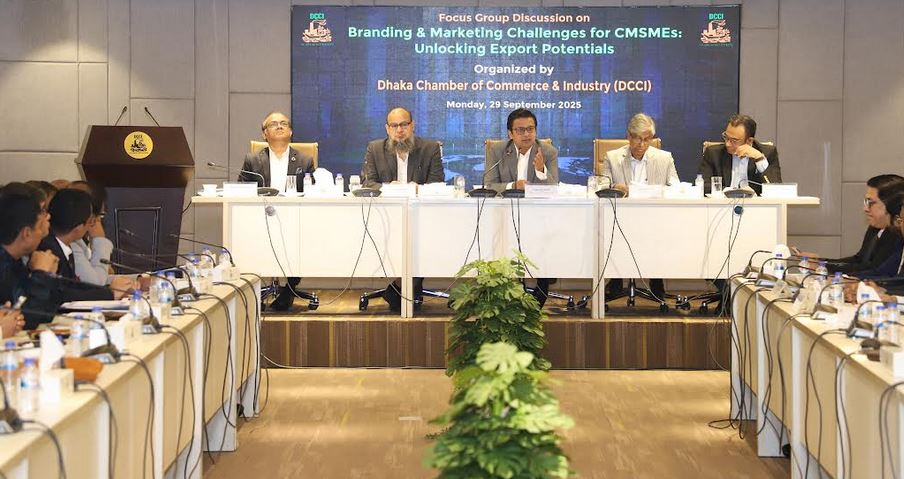News Flash

DHAKA, Sept 29, 2025 (BSS) - Experts at a discussion today laid emphasis on
effective branding, proper marketing strategies and compliance to boost
exports of Cottage, Micro, Small and Medium Enterprises (CMSMEs).
They observed that although CMSME's contribution to Bangladesh's GDP is
around 28 percent, in Sri Lanka, Vietnam and Cambodia, the contribution of
this sector stands at nearly 50 percent.
However, they mentioned, challenges such as limited access to finance,
inadequate infrastructure, shortage of skilled manpower, insufficient policy
support with stringent conditions, restricted access to local and global
markets, and slow adoption of new technologies continue to hinder the full
realization of Bangladesh's CMSMEs potential.
They made the remarks while speaking at the focus group discussion titled
"Branding and Marketing Challenges for CMSMEs: Unlocking Export Potential"
organised by the Dhaka Chamber of Commerce and Industry (DCCI) at its
auditorium in the city.
Speaking on the occasion, Md Obaidur Rahman, secretary, Ministry of
Industries, said that branding and marketing remain critically important yet
challenging for Bangladesh's CMSMEs.
He observed that the absence of strong national brands in the global market
has prevented the country from achieving its desired level of exports, and it
requires urgent attention.
The Secretary further remarked that Bangladesh's diplomatic missions abroad
are yet to play a crucial role in identifying trade opportunities and
challenges in international markets.
He also informed that the SME Policy and Industry Policy will be revised,
with new and emerging business sectors being incorporated into the framework.
Obaidur Rahman also underscored the importance of online trading which is
getting popularized in the country a lot.
He also suggested allowing trade marks to those entrepreneurs who do trading
online if possible.
The Secretary of the Ministry of Industries also emphasized that ensuring
product quality alongside effective branding is crucial, while the protection
and enforcement of intellectual property rights remains a critical challenge
for Bangladesh's CMSMEs.
The Ministry is working on strategies to enhance the export potential of
Bangladesh's Geographical Indication (GI) products, he added.
He stressed that a concerted effort among all government agencies is
essential for the sustainable development of this sector.
DCCI President Taskeen Ahmed highlighted that nearly 90 percent of
Bangladesh's industrial sector consists of CMSMEs and about 11.8 million
people are being employed by this sector.
He noted that due to additional tariffs imposed recently by the USA on
Bangladeshi exports, particularly on readymade garments, it will lead to
higher production and export costs.
To overcome these challenges, he stressed the local entrepreneurs to focus on
enhancing innovation and efficiency to reduce costs.
In addition, complexities in import-export operations, high product costs and
limited competitiveness in the global market continue to hinder the progress
of CMSME entrepreneurs.
To address these issues Dhaka Chamber President urged stronger support
measures, including certification and compliance facilitation, training and
incentives to enhance skills in sustainable technology adoption, product
quality improvement and branding, government support for expanding exports to
international markets, cluster development, integrated policy support,
development of a CMSME database, attracting foreign investment to expand
backward linkage industries and comprehensive support to the startup
entrepreneurs.
He said, "We need to embrace technology at a faster pace and need to leave
old school traditional thinking and mindset as we want to have more
development for our country."
Md Saiful Islam, chairman of Bangladesh Small and Cottage Industries
Corporation (BSCIC), said despite several institutional constraints, BSCIC
has been providing support to the entrepreneurs through the establishment of
industrial parks, low-cost financial assistance and training programs.
He noted that BSCIC is working to exempt holding taxes for industries
established within BSCIC industrial parks.
He stressed the urgent need to expand the presence of Bangladeshi products on
international digital platforms such as Amazon, E-bay, Alibaba etc.
Highlighting that the packaging and labeling of local products often lacks
attractive appeal, he stressed the entrepreneurs to look into this issue.
He also pointed out that the number of local enterprises obtaining
international certifications remains limited, which negatively impacts export
opportunities.
For the expansion of CMSMEs, the BSCIC Chairman further informed that his
organisation is working to develop an integrated database based on different
categories of this sector.
Mohammad Hasan Arif, vice-chairman and chief executive of Export Promotion
Bureau (EPB), said that in order to expand the presence of Bangladeshi
products in the global market and building a positive national image of our
product, at first, we need to change the mindset of the country's local
consumers.
He noted that consumer preferences, interests, and desires play a vital role
in product branding.
He further emphasized the importance of strengthening coordination between
the public and private sector.
Meanwhile, he announced that to ensure comprehensive support for the
entrepreneurs EPB will establish an Export Ecosystem Platform as well as a
CMSME Help Desk, where representatives from relevant government agencies will
be designated as focal points.
EPB will also arrange bilateral meetings to facilitate networking between
Bangladeshi entrepreneurs participating in international trade fairs and
their foreign counterparts, he added.
He informed that EPB is working to facilitate the participation of
Bangladeshi entrepreneurs in the upcoming trade fair to be held in Brazil
next year.
In addition, training programs will be organised with the support of both
local and international experts to enhance the skills of entrepreneurs, he
assured.
DCCI Senior Vice President Razeev H Chowdhury, Vice President Md. Salem
Sulaiman, as well as entrepreneurs and stakeholders from relevant sectors
also attended the event.